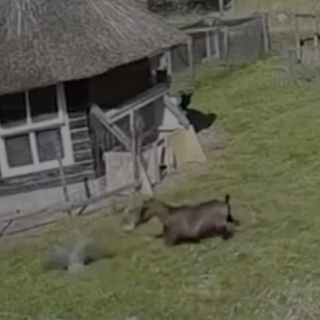Really interesting answer here.


Two screenshots. One of a goat saving a chicken from a hawk (yeah, that happens, in fact another chicken chose to also join the fight before the goat. 🐐). Then a scree about Chinese pork in an instacart order. So it goes. The rants will continue so long as just typing them is easy.
So the people down low are fighting over what have you and thinking (like I sometimes do) that a single individuals consumer choices will ever make a difference. How are our elites doing? After all 9T was printed out for them during the pandemic? Well they're making sure that they are holding on to that and also making sure that they are able to get us to fight one another for the scraps (inflation has risen faster in the US than other countries but so have corporate profits, an problem of the many monopoly or near monopoly corporations we have).
Note this also means breaking the back of any International progressive movement, and that means that the rhetoric over Russia and China is at a fever pitch, and no one in charge is pointing at the nukes and the doomsday clock and saying, yeah, we should slow down. [1] I swear, the idiots in charge of us amaze me with their stupidity and greed.
On slavery and rape (or relationships across the color lines in the US):
An interesting view and makes me want to add more books to my large unread pile. Sigh.So as you already mentioned, the sexual abuse and rape of enslaved black women by white males was, unfortunately, fairly widespread and tacitly accepted in the south, as I have touched on previously here. Sexual relations between white women and black men, however was considerably more rare, for a number of reasons, but they most certainly did happen, both in a plantation context, as well as more broadly.
The key thing to understand is that a white woman having sex with a black man was an all-around more threatening proposition to the social fabric of the antebellum South than was the situation of a white man and a black woman. While the latter could be excused, the former couldn't, as it was an extreme violation of perceived gender roles, and a threat to the very ideas of race.
First, let's back up a little bit though, and jump back to the late 1600s, when the system of slavery in America was still being defined, and racial boundaries were transgressed with slightly - but only slightly - more ease. In this period of time, we can see the early expressions of the issues mentioned above, with ideas that a white woman who 'coupled' with a black man was a "disgrace of our Nation". Of almost greater concern though was the creation of the freeborn mixed-race child, since, generally, slave or free status was inherited from the mother. This wasn't a situation of white mistresses of the plantation though, but low-class white indentured servants who were consorting with black male slaves. Laws started to be passed by the end of the 17th century to stamp out the practice, such as this one from Virginia which attached severe legal penalties for the bearing of a mixed-race child by a white woman, which would automatically indenture the child for thirty years, and her for five additional:
she [shall] pay the sume of fifteen pounds sterling . . . [or be] disposed of for five yeares ... such bastard [shall] be bound out as a servant ... untill he or she shall attaine the age of thirty yeares, and in case such English woman that shall have such bastard child be a servant, she shall be sold by the said church wardens, (after her time is expired that she ought by law to serve her master) for five yeares
Maryland was even harsher, with its 1664 law that, in the event of a marriage between white woman and black man, the woman would be legally considered a slave for her husband's lifetime in order to ensure her potential child was born with slave status (Virginia would simply exile you from the colony for it).
As we move through the Colonial era and into the antebellum period, the taboo only appears stronger than ever, but of course, it would be violated. As far as open relationships go, it remained mostly the realm of poor white women who would live with, or marry black men - not all states passed laws such as Maryland or Virginia - but there are records of plantation women defying convention, or of a planter's daughter's youthful rebellion being to run off with one of his slaves. They are few and far between, but their rarity likely stems at least as much from the social taboo of discussing them than from their near total absence, as they disproportionately come to use from foreign visitors writing of what they saw, such as Francisco de Miranda, who noted in his 1783-84 travelogue:
While [Howe, a planter on the Cape Fear river] amuses himself in dissipation elsewhere, his unfortunate family lives here; the wife has the manner of a divorcee, and one lovely daughter, eighteen years old, has just had two sons by one of the Negro slaves.
Other evidence comes to use from the recollections of slaves themselves told in the post-emancipation days, who either had observed the liaisons, or heard of them second hand. Record from the white, southern population itself does exist too, but these extra sources do help to indicate that there was likely more than the mere sliver indicated in files like divorce records.
Still though, to say it was an affront to the conception of gender by the white planter class would be an understatement though. The purity and chastity of the white, southern lady was very much put on a pedestal, and the idea of it being "sullied" by the sexuality of a black man was quite unconscionable. Control of female sexuality - both white and black - within their realm, ie the plantation, was an integral part of the white planter's identity and sense of honor; guarding of her chastity was how the white plantation lady maintained her own honor. If it was known that she had "sullied" it with a black man, she would be considered no better than the lowest of 'white trash' whores - that is to say, the above mentioned poor white women who would openly live with a black man.
Catherine Clinton sums up the double-standard quite succinctly when she notes "Women bore total sexual accountability; white men enjoyed total sexual control." The white master's 'dalliance' simply didn't threaten the social order, he wasn't violating his sexual role, and any offspring would remain a slave, neither of which was true for the woman who wished to follow suit. In the rare cases where a man sought a divorce, accusation that his wife had committed infidelity with a black man was a fairly common cause cited. In a survey of 123 divorce records by initiated by men, Schweninger found that 68 of them alleged infidelity with a black man, although it should be noted that in at least many of these cases, it wouldn't have been the mistress of the plantation forcing herself on a slave, since 83 percent of the cases came from non-slave owning families. It was truly a double humiliation to the Southern white to not only be a cuckold, but to be cuckolded by a black man. The high proportion of numbers in these cases shouldn't necessarily lead us to assume that slave-owning women weren't doing so as well, can also imply that those men, where such a revelation would be much more injurious to their status, may have dealt with such matters quietly, or even tried to live in ignorance of what was clear under their noses - many of the above cases cite the birth of a clearly mixed-race child to be the first revelation of the earlier affair.
So in short... it happened. Not too often, but it most certainly happened. A white lady of 'good society' taking up with a black man - free or slave - was truly one of the greatest taboos of the antebellum South though, which means they weren't writing about it in their diaries or letters. The records of it are sparse, but do show it happening, and we can, of course, easily surmise that for the small number of cases which did result in a paper trail, there are likely a few more at least which were kept quite in the interest of the veneer of family honor, or which went entirely undiscovered.
Clinton, C.. The Plantation Mistress: Woman’s World in the Old South, Pantheon Books. 1982Fox-Genovese, E. *Within the Plantation Housefold: Black and White Women of the Old South", The University of North Carolina Press, 1988Genovese, E. Roll, Jordan, Roll: The World the Slaves Made, Vintage Books, 1974Millward, J. "'The Relics of Slavery': Interracial Sex and Manumission in the American South", Frontiers: A Journal of Women Studies 31 (3), 2010 pp: 22-30Schweninger, L. Families in Crisis in the Old South: Divorce, Slavery, and the Law, The University of North Carolina Press, 2012
[1]Note, I mentioned how bad trump was in this regard and now it would appear that Biden is much worse.
Enjoyed it? Share it via email, facebook, twitter, or one of the buttons below (or through some other method you prefer). Thank you! As always, here's the tip jar. paypal.me/nlowhim Throw some change in there & help cover the costs of running this thing. You can use paypal or a credit card.

Nelson Lowhim's Blog
- Nelson Lowhim's profile
- 14 followers



